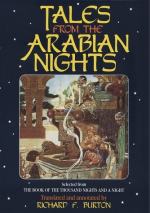[FN#279] I am not aware that the specific gravity of the milks has ever been determined by modern science; and perhaps the experiment is worthy a trial.
[FN#280] Arab. “Duna-k.” See vol. iv. p. 20.
[FN#281] “Al-Waziru’l-Arif bi-llahi Ta’ala,” a title intended to mimic those of the Abbaside Caliphs; such as “Mu’tasim bi’llah” (servant of Allah), the first of the long line whose names begin with an epithet (the Truster, the Implorer, etc.), and ed with “bi’llah.”
[FN#282] [Tarajjama, which is too frequently used in this Ms. to be merely considered as a clerical error, I suppose to mean: he pronounced for him the formula: “A’uzzu bi llahi mina ’l-Shaytani ’l-Rajimi” = I take refuge with Allah against Satan the Stoned. See Koran xvi. 100. It would be thus equivalent with the usual taáwwaza.-St.]
[FN#283] The Ms. here ends Night cdxii. and begins the next. Up to this point I have followed the numeration but from this forwards as the Nights become unconscionably short compared with the intervening dialogues, I have thrown two and sometimes three into one. The Arabic numbers are, however, preserved for easier reference.
[FN#284] This is a poor and scamped version of “Ali the Persian and the Kurd Sharper,” in vol. v. 149. It is therefore omitted.
[FN#285] The dish-cover, usually made of neatly plaited straw variously coloured, is always used, not only for cleanliness but to prevent the Evil Eye falling upon and infecting the food.
[FN#286] The “Bamiyah,” which = the Gumbo, Occra (Okra) or Bhendi of Brit. India which names the celebrated bazar of Bombay, is the esculent hibiscus, the polygonal pod (some three inches long and thick as a man’s finger) full of seeds and mucilage making it an excellent material for soups and stews. It is a favourite dish in Egypt and usually eaten with a squeeze of lime-juice. See Lane, Mod. Egypt. chapt. v., and Herklots (App. p. xlii.) who notices the curry of “Bandaki” or Hibiscus esculentus.
[FN#287] Written “Bakshish,” after Fellah-fashion.
[FN#288] [In the Ms.: Wa’l-Sultanu karaa Wirduh (Wirda-hu) wa jalasa li Munadamah = And the Sovran recited his appointed portion of the Koran, and then sat down to convivial converse. This reminds of the various passages of the present Shah of Persia’s Diary, in which he mentions the performance of his evening devotions, before setting out for some social gathering, say a supper in the Guildhall, which he neatly explains as a dinner after midnight (Sham ba’d az nisf-i-shab).—St.]
[FN#289] This is Scott’s “Story of the Three Princes and Enchanting Bird,” vol. vi. 160. On the margin of the W. M. Ms. he has written, “Story of the King and his Three Sons and the Enchanting Bird” (vol. i. Night cdxvii.). Gauttier, vi. 292, names it Histoire des Trois Princes et de l’Oiseau Magicien. Galland may have used parts of it in the “Two Sisters who envied their Cadette”: see Supp. vol. iii. pp. 313-361.




